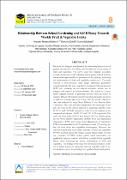Relationship Between School Gardening and Self-Efficacy Towards Weekly Fruit & Vegetable Intake

View/
Date
2020-11-27Author
Kafeero, Hussein Mukasa
Kavuma, David
Mbabazi, Scovia
Metadata
Show full item recordAbstract
The study was designed to understand the relationship between school gardens and student’s self-efficacy and its effect on weekly intake of fruits and vegetables. The survey used two Ugandan secondary schools; one having a well-established school garden with all students having equal opportunities to participate in the growing, harvesting and consumptions of fruits and vegetables, another not. The study followed a cross-sectional study design employing quantitative research methods. The target population comprised of late adolescents 18-22 years attending the two-selected secondary school; one in Kampala and another in Luwero districts. The school in Luwero district engaged students in gardening activities while the school in Kampala did not. Self-administered structured questionnaire was given to students to answer questions in line with the specific objectives. Data was analyzed by using Mann Whitney U test, Pearson Rank Correlation, Odds ratio and test of proportion. The mean ages of thegirls and boys in the school exposed to gardening activities were 19.10±1.4 and 19.2±2.86respectively while those for students in the unexposed school were 18.62±1.21 and 19.11±1.29 respectively. The study had more males (56.3%) than females (43.7%). Neither group met the World Health Organization (WHO), Food and Agricultural Organization (FAO) and United States Department of Agriculture (USDA) recommendation of ≥35 servings per week (≥5 servings per day) for both fruits and vegetables consumption. However, the exposed students had more weekly servings of fruits and vegetables (P>0.05) and had higher self-efficacy towards dietary intake of fruits and vegetables (P=0.007). School garden based intervention can significantly improve student’s self-efficacy towards fruit & vegetable dietary intake increasing the weekly consumption of fruits and vegetables. The findings of the study will inform policy makers on the role of school gardens in enhancing fruit and vegetable intake by in-school adolescents as they develop the Uganda’s school health policy.
Collections
- Research Papers [57]
